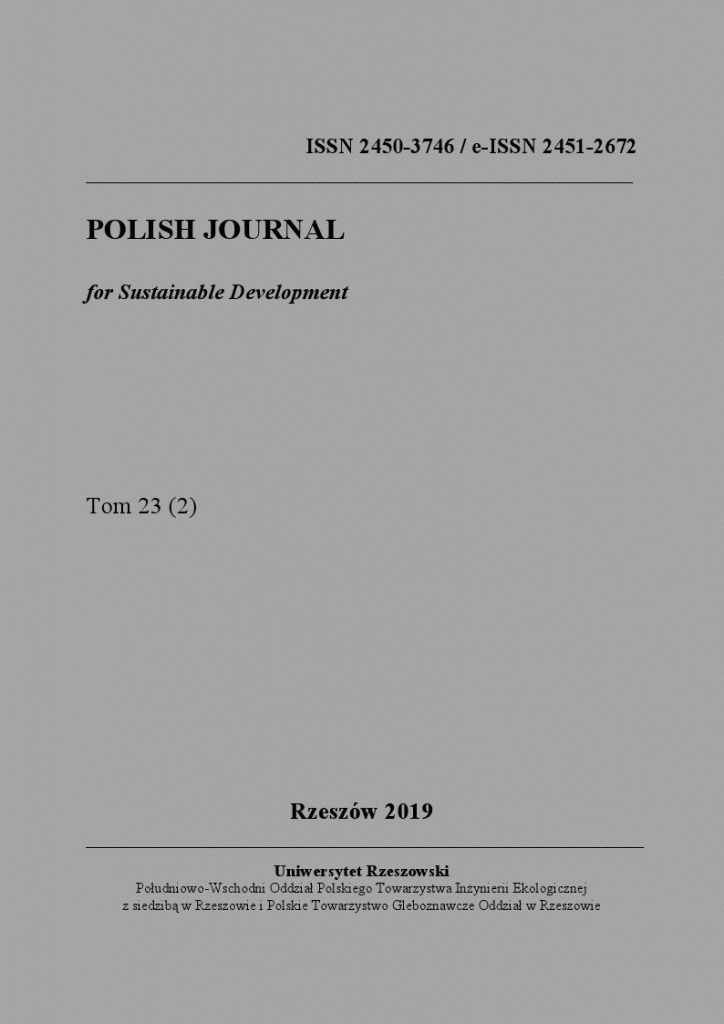Options for utilisation of waste from meat industry in compliance with the rules of bioeconomy
DOI:
https://doi.org/10.15584/pjsd.2019.23.2.8Keywords:
sustainable development, bioeconomy, meat industry, wasteAbstract
Playing an important part in domestic economy, meat industry mainly comprises companies involved in slaughter of animals, meat boning and cutting, and production of processed meats. Despite cutting-edge infrastructures and advanced technologies, abattoirs and meat processing plants are still ranked among those enterprises which generate waste and as a result significantly contribute to deterioration of the environment. The greatest problems are connected with abattoir waste, and meat meal as well as meat and bone meal produced from such waste. The prohibition to use this type of fodder in livestock farming has led to additional problems in the rational utilisation of the waste. As a result of changes in energy laws, there is increasing interest in waste biomass from meat processing, which may constitute an important source of energy for power industry. Thermal utilisation of animal meals may be as an important source of energy and serve as an example of practical implementation of the principles of sustainable development and bioeconomy.
Downloads
References
Białecka B. 2008. Gospodarka odpadami z przemysłu rolno-spożywczego w województwie śląskim. Problemy Ekologii. 12 (1). 28-32.
Chyłek E. K., Rzepecka M. 2011. Biogospodarka - konkurencyjność i zrównoważone wykorzystanie zasobów. Polish Journalof Agronomy. 7. 3-13.
Czernyszewicz E. 2016. Uwarunkowania i perspektywy rozwoju biogospodarki w Unii Europejskiej. Zeszyty Naukowe Szkoły Głównej Gospodarstwa Wiejskiego w Warszawie. Problemy Rolnictwa Światowego. XXXI (3). 49-56.
Gilewski R., Wężyk S. 2018. Perspektywy rozwoju drobiarstwa do 2020 roku. Ogólnopolski Informator Drobiowy. 12. 38-42.
Kapusta F. 2013. Wybrane zagadnienia z produkcji i przetwórstwa mięsa w Polsce w pierwszej dekadzie XXI wieku. Nauki Inżynierskie i Technologie. 2. (9). 67-84.
Karcz H., Kantorek M. 2009. Możliwości wykorzystania mączki mięsno - kostnej jako paliwa w instalacjach energetycznych. Ekologia i Energetyka. 1. 39-47.
Karcz H., Kozakiewicz A. 2007. Sposób termicznej utylizacji odpadów zwierzęcych. Ekologia i Energetyka. 11. 823-831.
Kasztelan A. 2012. Wpływ przemysłu spożywczego na środowisko w Polsce. Przemysł Spożywczy. 11. 12-16.
Konarska M., Sakowska A., Przybysz M.A., Popis E. 2015. Produkcja i spożycie mięsa drobiowego w Polsce i na świcie. Zeszyty Naukowe Szkoły Głównej Gospodarstwa Wiejskiego w Warszawie. Problemy Rolnictwa Światowego. 15. (2). 96-105.
Kowalski Z., Krupa-Żuczek K. 2007. Modelowe rozwiązanie bezodpadowej gospodarki odpadami mięsnymi. Laboratoria - Aparatura - Badania. 5. 20-27.
Kozioł I., Krzywoń M. 2014. Stan przemysłu drobiarskiego w Polsce. Progress in Economic Sciences. 1. 85-98.
Kozłowski K., Cieślik M., Smurzyńska A., Lewicki A., Jas M. 2015. Wykorzystanie odpadów z przetwórstwa mięsnego na cele energetyczne. Nauki Inżynierskie i Technologie. 1 (16). 36-46.
Luhova M. 2015. Selected types of investments enabling development of bioeconomy in the region. Economic and Regional Studies. 8 (3). 100-110.
Mroczek R. 2015. Dominanty i perspektywy rozwoju przemysłu mięsnego i drobiarskiego w Polsce w warunkach integracji z Unią Europejską. Zeszyty Naukowe Szkoły Głównej Gospodarstwa Wiejskiego w Warszawie. Problemy Rolnictwa Światowego. 15 (1). 58-67.
Myczko A., Karcz H., Wierzbicki K. 2010. Termiczne przekształcanie odpadów kłopotliwych na przykładzie mączki zwierzęcej. Mazowsze - Studia Regionale. 5. 119-127.
Rozporządzenie Komisji (UE) Nr 56/2013 z dnia 16 stycznia 2013 r. zmieniające załączniki I i IV do rozporządzenia Parlamentu Europejskiego i Rady (WE) nr 999/2001 ustanawiającego zasady dotyczące zapobiegania, kontroli i zwalczania niektórych przenośnych gąbczastych encefalopatii. Urzędowy Dziennik Unii Europejskiej. L 21. 3-16.
Sobczak A., Błaszczek E. 2009. Kierunki zagospodarowania produktów ubocznych z przemysłu mięsnego. Czasopismo Techniczne. Chemia. 106 (4). 141-151.
Staroń A., Kowalski Z., Banach M., Wzorek Z. 2010. Sposoby termicznej utylizacji odpadów z przemysłu mięsnego. Czasopismo Techniczne. Chemia. 107 (10). 323-332.
Szybiga K., Prymonk K. 2009. Konkurencyjność i innowacyjność przedsiębiorstw przemysłu mięsnego. Żywność. Nauka. Technologia. Jakość. 3 (64). 84-94.
Tereszczuk M. 2015. Ocena porównawcza polskiego przemysłu mięsnego na tle wybranych krajów Unii Europejskiej. Stowarzyszenie Ekonomistów Rolnictwa i Agrobiznesu. Roczniki Naukowe. XVII. (4). 319-314.
Weiner A., Paprocka I., Gołębiowska A., Kwiatek K. 2012. Aktualna sytuacja w zakresie stosowania, metod wykrywania i identyfikacji gatunkowej mączek mięsno-kostnych. Życie Weterynaryjne. 87 (12). 1035-1037.
Downloads
Published
Issue
Section
License
Copyright (c) 2019 Polish Journal for Sustainable Development

This work is licensed under a Creative Commons Attribution-NonCommercial-NoDerivatives 4.0 International License.


